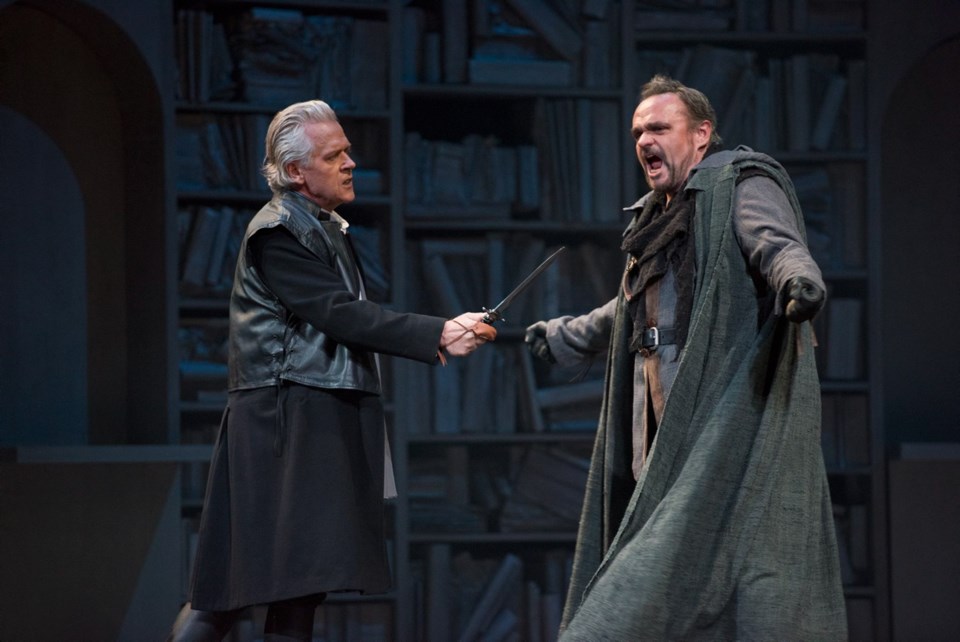PREVIEW
What: Simon Boccanegra
Where: Royal Theatre
When: Oct. 13, 15, 19, 21, 23
Tickets: $25 to $135
The lead role in Verdi’s opera Simon Boccanegra is not for the faint of heart.
The character of Simon, the giant-hearted doge of Genoa, is deep and complex. And strictly in terms of singing, it’s a formidable technical challenge.
Any baritone brave enough to tackle it must be a Verdi specialist, able to shift from the lower/middle registers to high, lyrical passages. The latter require a keening (but not shrill) vocal quality.
In the opera world, this is called squillo.
“You have to do that to penetrate the orchestra’s sound. It’s not about loud singing. It’s about timbre and a focus in your voice,” said Philadelphia baritone Todd Thomas, who sings Simon in Pacific Opera Victoria’s Simon Boccanegra.
Specializing in Verdi’s operas is difficult at the best of times. One critic describes those who do as “the elite athletes of opera.” Glynis Leyshon, who is stage-directing Simon Boccanegra, said the role of Simon is to opera what the Olympian part of Hamlet is for actors.
“It’s hardest on Todd because Simon is the show, he’s the through-line,” Leyshon said.
This is Thomas’s first crack at Simon Boccanegra, a role he hopes to reprise in the future. Yet he’s no stranger to Verdi, having sung Otello (with POV last year and the Lyric Opera of Chicago), Rigoletto, Nabucco, Macbeth, Falstaff, Attila and La Battaglia de Legnano.
Aside from the rigours of singing, Thomas said what is daunting is conveying Simon’s personality, which is “global in scope and also personal.” The character’s immense capacity for forgiveness and humanitarianism must be conveyed.
“There’s a nobility in Simon Boccanegra that is so unlike any other part I’ve seen,” Thomas said.
Simon Boccanegra isn’t performed as often as some of Verdi’s operas, and it’s certainly not in the Opera Top 10 (La Bohème, Tosca, Madama Butterfly, et al.). It’s renowned for its beautiful melodies. However, the plot is complex, even Byzantine — especially for modern audiences in the age of Facebook and Twitter.
Space doesn’t permit a full synopsis; suffice to say the storyline is replete with double-crossing, secret murder plots, plans for revenge and government overthrows, concealed identities and so forth. Leyshon said she has tried to avoid emphasizing the “bells and whistles” within the complicated, melodramatic plot. Instead, the focus is on the humanity of the characters.
This production is conducted by Timothy Vernon and designed by Camellia Koo. The set and costumes have a period feel (“we still have daggers, we still have knives”) while retaining a modern look. The central set is a stylized library.
“The idea of the word — thoughts and ideas — being more important than the sword is, I think, the big picture,” Leyshon said. Thomas’s previous performances with POV were as bad guys. In the 2014 production of Das Rheingold, he was the evil Alberich, gloating over a magic ring. In Otello, Thomas portrayed Iago as a nihilistic super-villain.
In real life, Simon Boccanegra — with his magnanimity and his devotion to family — is much closer to Thomas’s own character, Leyshon said.
“I know when Simon embraces his daughter at the end of the opera, that’s a real father embracing his daughter. And he knows. He knows whereof he speaks,” she said.
Married to a church musician, Thomas has two sons and two daughters. Family is indeed important to him. He said he has found the itinerant life of the opera singer is “very, very difficult” in that it pulls him away from his loved ones.
Last spring, Thomas cancelled his role in a production of Romeo and Juliet with the Atlanta Opera because he thought his boys needed him at the time. The last-minute decision was a first for him. “I was all packed and ready to go to the airport. And I said: ‘I can’t go. I cannot get on the plane,’ ” he said.
“There were not huge issues. Nobody was in trouble or anything like that. But I felt so compelled not to leave my son, who was 16 at time. I felt he needed me around. And my eight-year-old boy, too.”
Happily, Thomas has found solace within the family-like atmosphere of Pacific Opera Victoria. For this, he gives much credit to founding artistic director Vernon.
“He often says: ‘You’re away from your real family, but this becomes your family,’ ” he said.
This, added Thomas, is not always with case with other opera companies. “When the show closes, it’s like: ‘Thank you very much, don’t let the door hit you on the way out.’ ”



